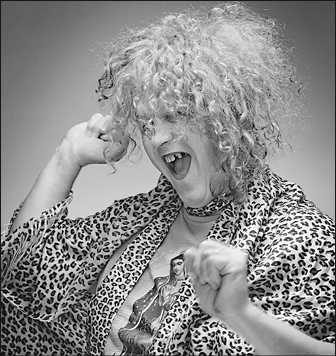By Todd Simmons
Never having heard her music, I went to see Baby Dee at Joe’s Pub out of sheer curiosity, my interest piqued by her bizarre résumé. A transsexual performance artist/songwriter/bear-suit wearing, Central Park-busking harpist/Coney Island sideshow attraction who later played piano in a church in the Bronx for a decade before returning to Cleveland to care for ailing parents and run a tree removal business?
This I had to see.
But when the wildly coiffed redhead in leopard-print trousers sat down before the grand piano with a glass of beer and launched into a set of vaudevillian songs, it was evident that Baby Dee was no novelty act. Sure, her playful between-song patter and cackling laughter had the room in stitches, but there was more substance here than befits a cabaret performer. Performing her new album, “Safe Inside The Day,” in its entirety, she made clear that her outsized persona was merely the vehicle for delivering her catchy songbook with an expressive voice to a crowd that responded to her like a legend—not as the fringe character she may have been cast.
Co-produced by indie icon Bonnie ‘Prince’ Billy and Matt Sweeney, the superb “Safe Inside The Day” (Drag City) was recorded at Rare Book Room, in Brooklyn. “This album is very much about the street I grew up on,” Baby Dee wrote on her website. A dreamy, sinister and uproarious account of her childhood in Cleveland, Ohio, growing up as a conflicted little boy who would eventually become a woman, the rollicking songs—reminiscent of musical theater—possess equal parts hilarity and anguish. “Big Titty Bee Girl (From Dino Town)” is, frankly, the most wickedly absurd, exacting critique of prejudice I have ever heard. Listening to the ironically jovial, how-to song about tormenting albinos, it is easy to imagine Shirley Temple performing the tune in tap shoes. “The Only Bones That Show” and “The Earlie King” are like a cross between Tom Waits and Ethel Merman with a splash of the Tiger Lillies. Straight out of the music hall tradition, these infectious numbers wouldn’t be out of place in 1920s Berlin.
Baby Dee may live as a woman now but her falsetto-rich singing voice remains quite masculine. Along with her piano, it is also a great instrument for animating the characters in her songs. She can sing like a drunken sailor, like a child playing make-believe alone in his/her room, or like a siren from David Bowie’s “Hunky Dory” album; muted saxophone and keys included. She can also deliver a ballad with sincerity. In contrast to the extroverted vocal performances, “Safe Inside the Day” contains several instrumental works that provide a sense of introspection. While Baby Dee is not shy about calling out her thoughts lyrically, these moody, hauntingly melancholic pieces convey the most authentic sense of her interior world.
The song that might aptly reveal the genesis of this artist’s sensibility is “The Dance of Diminishing Possibilities.” Baby Dee told the Cleveland Plain Dealer that as a four-year-old she witnessed all the men and boys on her block destroying an upright piano abandoned on the sidewalk. Because Department of Sanitation refused to remove such a cumbersome piece of “trash,” the hatchet and hammer-wielding mob pummeled the instrument until there was nothing left but splinters—and the intact harp. In the song she sings, “There’s a harp in that piano/there’s a girl inside that boy/and my Daddy’s crowbars/are his pride and joy.” Amidst the commotion came a revelatory moment of clarity. “They had a ball,” she recounted, “it was the friendliest thing that ever happened on that block.”
Baby Dee would not only find “the girl inside that boy” but, upon moving to New York City in 1972, would also end up playing a harp herself—first dressed as a bear in Central Park, and later on a giant tricycle that she rode around the Village wearing a cat-suit or made up like the aforementioned Shirley Temple.
In spite of the fraught identity crises and strong resistance from society, Baby Dee doesn’t come off as a victim of circumstance, but a take-charge individual who has adjusted year to year, continuously finding new ways to express herself as an artist. Photos of her in the Coney Island sideshow as the “Bilateral Hermaphrodite,” dressed as half-man/half-woman, reveal inner confidence. This self-acceptance has attracted many creative people to her side, and resulted in “Safe Inside The Day,” her first album with a full band. A close friendship with Antony Hegarty, of Antony and The Johnsons, may have pushed her off the streets and onto the stage. Later, Will “Bonnie ‘Prince’ Billy” Oldham of Palace Music fame asked Baby Dee to open some shows for him and Matt Sweeney on their Superwolf tour. Their friendship evolved into a collaboration and along with the unlikely addition of metal-dance sensation Andrew W.K. on bass and a gaggle of other backing musicians, they recorded the album last year. The result is a boldly entertaining LP that is heartbreaking, amusing and occasionally deranged. When she sings, “Life is bitter and death is sweet,” one wonders what this otherworldly soul knows that we don’t.
In this age of total access and global influence, the clichéd description “one of a kind” seems as obsolete as an eight-track. Musicians are pumped out assembly-style by the music industry hoping for one to stick to the collective consciousness, but with an outrageous personal history and a musical genre both experimental and poetic, it is safe to say that Baby Dee is the only inhabitant of her strange, beautiful world. You can’t help but pull for an artist who unabashedly dives into her work like Baby Dee does. Trust that she is as authentic as they get.

































